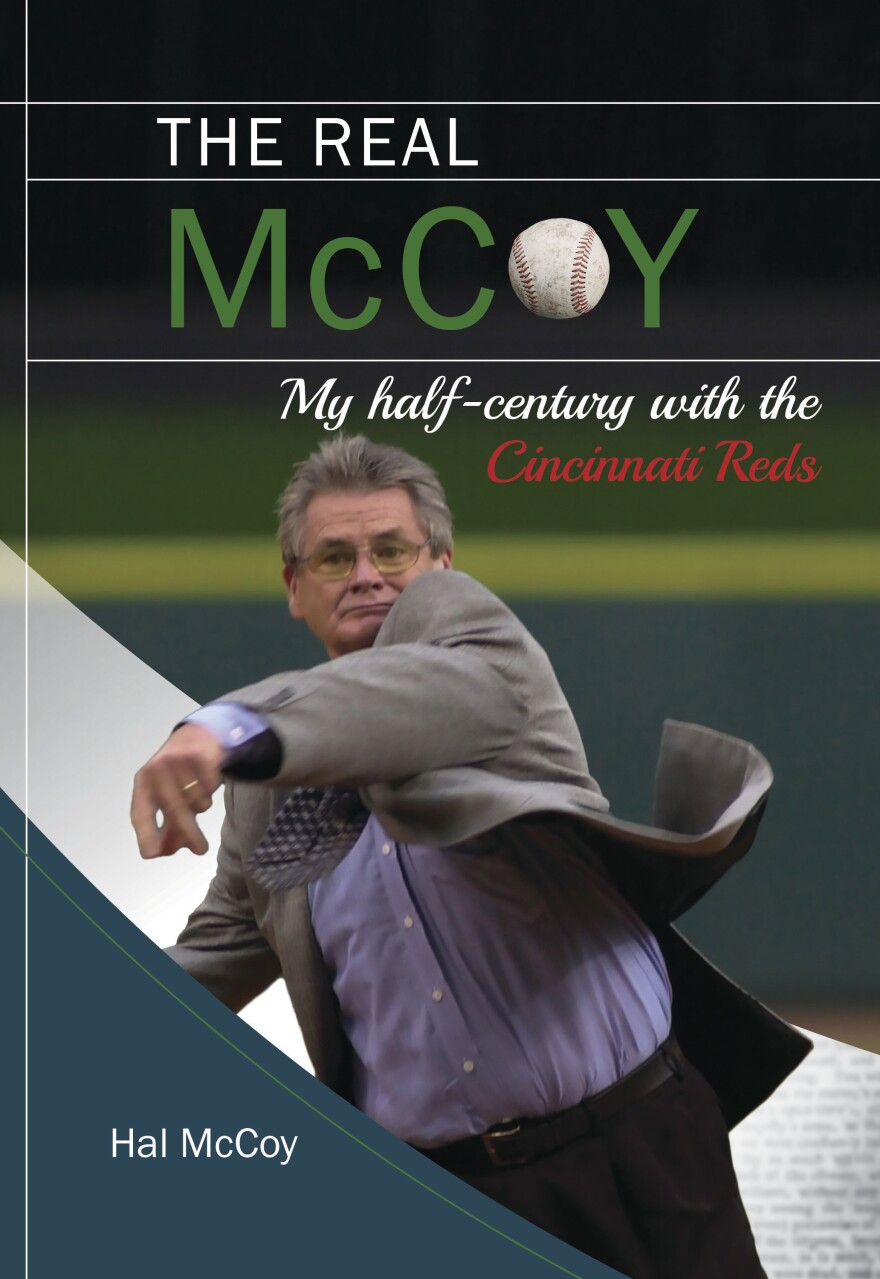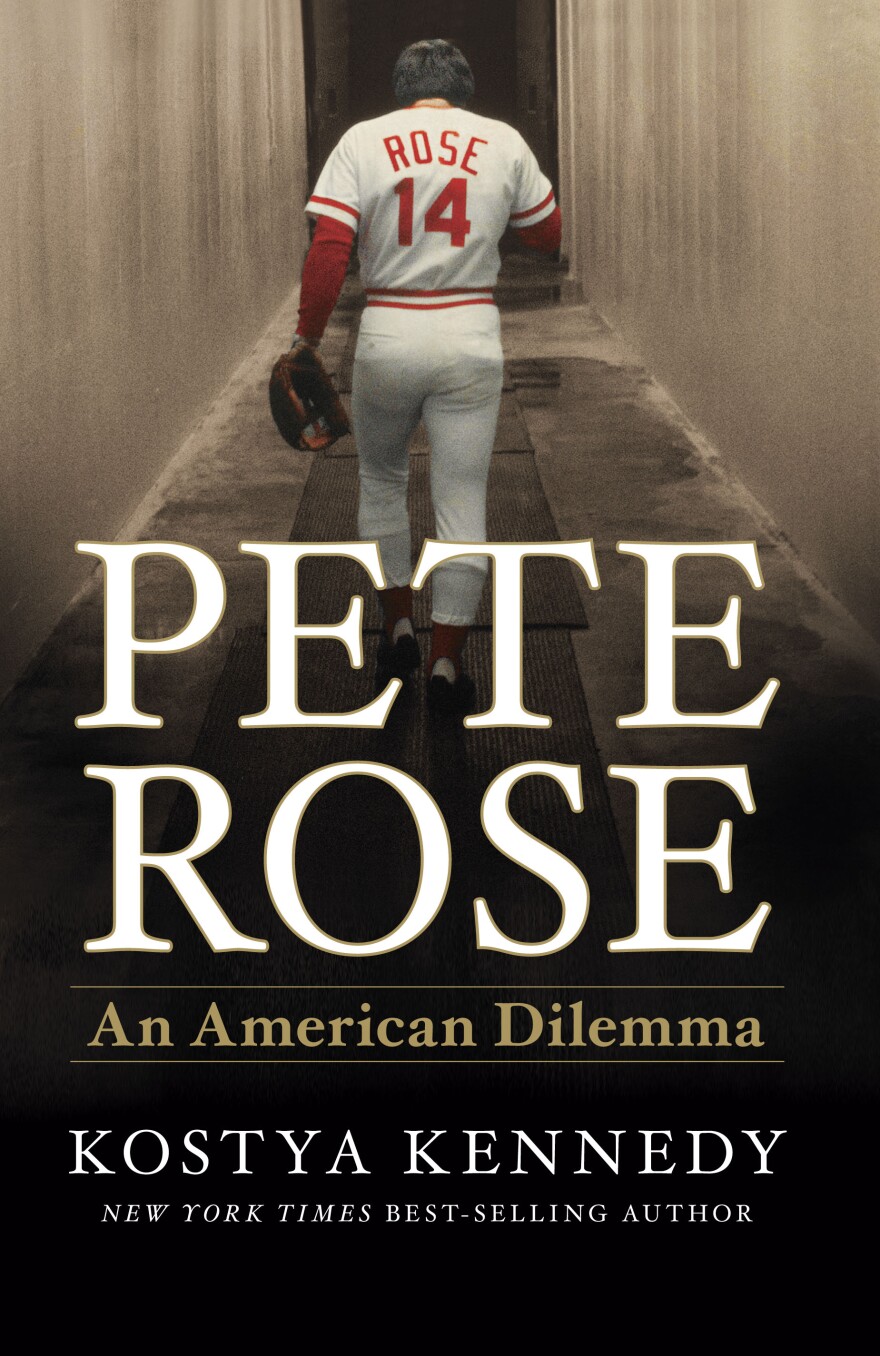Baseball's All Star Game comes to Cincinnati on Tuesday, and controversial Reds legend Pete Rose is scheduled to be on the field. This spring, Rose applied to the commissioner of Major League Baseball for re-instatement, 26 years after he was banned from baseball for gambling. Community Voices producer Dave Barber explores baseball's complicated relationship with the man known as The Hit King.
“The banishment for life of Pete Rose from baseball is the sad end of a sorry episode. One of the game's greatest players has engaged in a variety of acts which have stained the game. And he will now have to live with the consequences of those acts," said Bart Giamatti, Commissioner of Major League Baseball in August 1989.

That spring he had assigned lawyer John Dowd to collect the evidence that led to his ruling. On June 22 ESPN reported that the Cincinnati Reds legend had gambled on the game not only as a manager but as a player. It was hardly a surprise to anyone who has peeked at the 228 page document from the investigation that became famous as The Dowd Report. Rose's obsession with money and history of gambling has been thoroughly documented.
Hal McCoy is a member of the media wing of the National Baseball Hall of Fame. His book The Real McCoy; My Half Century with the Cincinnati Reds was published this spring. He became beat writer with the Reds for the Dayton Daily News in 1973. He covered Rose in close quarters and was in the thick of covering the gambling scandal.
"Pete was the most competitive person I ever covered in sports. Everything was competitive with him.” says McCoy. “ I think that translated into what happened to him in betting on baseball. Rule 21 C is on the clubhouse door of every ballpark in America. If you bet on baseball you will be banned for life. But Pete thought he would be the “teflon” man and that he was Pete Rose and would not be punished. We all knew he loved to gamble. As a kid his father Harry took him to River Downs. When he played and managed he went to the dog tracks in Florida during spring training. I know he liked to bet on football and basketball. He talked about that all the time. But none of us who surrounded him would ever suspect he would bet on baseball. There was never any indication at all. ”
The timing of the ESPN report has raised eyebrows. Reds majority owner Robert Castellini announced in January that Rose would be part of this year's All Star game festivities at Great American Ball Park.
Castellini and the Reds management had carefully created this opportunity and many others over the years for Rose to be celebrated in his hometown. Here was a chance for Rose to be recognized with his peers on a national stage. So why was this information—that Rose had gambled as a player as well as a manager—information that would seem to hurt his chances for reinstatement — why would that information be released now and not after the All Star game?
It's hard to know. But twenty six years after the ban on Rose, Major League baseball is in a different place, Today it takes in millions of dollars a year in advertising revenue from casinos and is an equity partner with the Walt Disney Company on the daily baseball fantasy site called Draft Kings.
Viewers tuning in to the 5:30 PM edition of Baseball Tonight on ESPN get a preview of that evening's games. The program starts with insights from a mix of former players, writer/commentators and a studio host. A few minutes in they pan left to 27 year old Derek Carty. He sits separately with two laptops, looking like he was consigned to the kids table at Thanksgiving dinner. He's a stat specialist in a sport obsessed with numbers. His job, and he's been analyzing baseball statistics since his teens, is to inform viewers on who's hot and who's not among potential fantasy picks before the games begin. His segments are nearly always bracketed with commercials for Draft Kings and its near twin fantasy site Fan Duel. Advertising for the two sites is everywhere you see sports. Fantasy football generates 11 billion dollars a year and boosts the TV ratings of many games otherwise deemed irrelevant. Attracting stat-driven millennials is now a marketing priority for baseball, as it is for all major sports.

Last year Kostya Kennedy, an assistant managing editor at Sports Illustrated, wrote a polished, evenhanded biography of the former Red, Pete Rose: An American Dilemma. I asked Kennedy about baseball's recent gamblingrelated partnerships and its influence on Rose's status.
“A lot of fans love all the statistics, and here's a way to engage them. One reason why it's not considered gambling is because the more you know, the more likely you are to win. Which isn't true of traditional gambling. Whether or not Draft Kings is gambling, that's the rub. They have taken pains to set themselves up as a skillbased game. It's close to gambling. I think it does influence the way Rose is looked at and it is somewhat of a conflict. Even more so to me though are the advertisements you see—in Cincinnati the Horseshoe Casino—but in other places, Citifield in New York for example you have the Caesars Club, which is run by Harrah's which has a huge sports book which does lots of baseball. Baseball has been more and more willing to have sponsorship deals and have partnerships with gambling entities. And it's been going that way for a long time. The days when Mickey Mantle and Willie Mays might be suspended for representing a casino on a golf course seems a sweeter time. Now whole teams and leagues are representing casinos. It's not necessarily a conflict with the decision because the decision was made when the rules were what they were. But this is a very different thing than an actual player or manager betting on games in which his team is involved and betting large and regular sums of money.”
Dr. Dennis Fong is codirector of the UCLA Gambling Studies program, which is looking closely at daily fantasy sites and the behaviors associated with them. The sites are clearly attracting a new generation of fans bound to their computers and mobile devices. For Fong it's too early to gauge the size of a future problem, but the ethical issues are in plain sight.
“You put money in. You hope something good happens based on essentially luck and you get money back if you win and you lose your money if someone beats you. That's gambling to me. But the larger issue for me is what does it mean for these large industries of sport to be partnering with family-oriented companies like Disney to openly promote gambling? That's a conversation that people are not having. Nowhere in the print or TV advertising are these sites described as gambling. Same day fantasy sports have done a remarkable job of marketing away that side. And thanks to a loophole in the Federal Wire Act which describes them as “games of skill”, they are not legislated.”
The Rose decision, or lack of one, has been one of the few baseball stories that moves the needle in a football-dominated American sports culture. Rose's standing as a baseball outlaw keeps him in the conversation year round. And for a 74 year old former player, that's rare. In any sport.
Between signing his name, public events where he talks about his career, a reality show, television commercials for sneakers and a new role, baseball analyst for Fox Sports, the business of being Pete Rose continues to be a lucrative enterprise. And he's proven to be good business for Major League Baseball. And MLB, while keeping the ruling on Rose in effect, seems to recalibrate the parameters of the ban when money comes calling.
MasterCard, a 100 million dollar sponsor of MLB in 1999, wanted Rose in the mix when fans had a chance to vote on that season's All Century Team. He was voted in and on the field at that year's World Series. He will be on the field Tuesday in Cincinnati when he joins fellow Reds Johnny Bench, Joe Morgan and Barry Larkin as part of MLB's Franchise Four promotion for the AllStar Game.
Astute baseball observers like Kennedy and Bob Costas say that if Rose had a legitimate argument before June 22nd it wasn't because he was banished from baseball for life. It was because he wasn't allowed on the Hall of Fame ballot. Costas appeared on the June 24th edition of the nationally syndicated sports talk program The Rich Eisen Show and offered this analysis.
“Where his real argument was was for being placed on the Hall of Fame ballot because The Hall of Fame's board of directors in 1991 had said that anyone on the permanently ineligible list was ineligible for the Hall of Fame ballot and Pete had been banned by Bart Giamatti with no mention of the Hall of Fame in 1989. Now clearly that was an ex post facto rule that was aimed at Pete and Pete alone. I believe Rob Manfred—that he was willing to approach it with an open mind, but it's case closed for the time being. Because it's just not going to fly in the court of public opinion now. The atmosphere is entirely wrong when we find out there is another layer to his lies. I don't think he ever deserved to be reinstated. The rule is clear. It may be worse to bet against your team. It may be worse to bet on your team or against them than on a game elsewhere in the league. But the penalty is clear. If as an active participant you bet on baseball—manager, coach, player, umpire—permanent banishment. So he faced permanent banishment for what he did.”
Baseball's hallowed major records are again being tainted this summer—this time by performance enhancing drugs— as former PED user Alex Rodriguez joined Willie Mays and Hank Aaron at the 600 home run/3000 hit plateau. No meeting has been scheduled between Rose, who holds 17 major league records of his own including the alltime record for hits, and MLB commissioner Rob Manfred. As the Draft Kings and casino ad money rolls in for Major League Baseball, Rose will likely stay in the spotlight and live comfortably in an exile of his own design. The National Baseball Hall of Fame is now an unlikely destination. But as permanent punishment goes, for Pete Rose, it could look a lot worse.
Further Reading:
- The Real McCoy: My Half Century With The Cincinnati Reds by Hal McCoy
Hal's blog with the Dayton Daily News
http://www.daytondailynews.com/blogs/content/shared-gen/blogs/dayton/cincinnatireds/
He also live blogs during Reds home games for Fox Sports Ohio
http://www.foxsports.com/mlb/cincinnati-reds-team - Pete Rose: An American Dilemma by Kostya Kennedy
http://www.kostyakennedy.com/ - From the New Yorker, Ben McGrath explores the evolution of fantasy sports.
http://www.newyorker.com/magazine/2015/04/13/dream-teams


